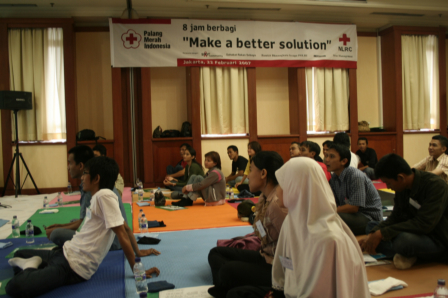Voices: "The Problems Started When I Was 14…"
March 2008—Chandrika supervises the HIV/AIDS program of a humanitarian aid organization in Indonesia. Because of stigma, she requested that her full name and place of work not be disclosed.
The problems started when I was 14 and in junior high school, a happy girl in a happy family. My grades were great and I was active in my school's organizations. And I was very close to my older brother.
One morning, my brother came into my room with heroin in his hand. At that age I always followed what he did, so I felt I had to try the drug. In June 2001, a few years later, my parents admitted my brother into rehab. We used the drugs for fun at first, but by that time we needed it more than anything.
With my brother in rehab, I turned to his friends, spending all day with them. We would buy heroin and they would inject it for me, as I could never do it on my own. We always shared needles and some days, if we were short on money, we would re-use needles from the day before. We knew nothing about HIV/AIDS and still less about the risk of sharing needles.

Chandrika participated in a mind, body, and soul workshop for people living with HIV/AIDS organized by the Red Cross.
|
Feeling fed up with my addiction, I asked my parents to find me help, and in October 2001 I entered a drug abuse rehab center for women. Soon, the center instituted a new regulation: every resident should be tested for HIV. I agreed to the test out of curiosity, totally unaware of the risks associated with my previous behavior. When I found out I was positive, I was shocked. I was upset with God and I felt an immediate isolation from everyone in my life. I cried constantly, I had suicidal thoughts. My friends tried to tell me that it wasn't the end of the world but their advice meant nothing to me. They didn't know how it felt to be in my position.
After my diagnosis, I told my parents and my siblings. My older brother felt so guilty. He was tested three times for HIV and was negative. "Why did it have to be my sister?" he said. "Why wasn't it me?" My family and friends were supportive but there was much that they didn't understand. At first, my mother separated my dining utensils at meals. It made me feel terrible but I knew she did it because my family had no information about HIV/AIDS. Their lack of knowledge inspired me to apply to become a drug abuse counselor in my rehab center. To limit HIV infection among injection drug users, the government should provide more funding for rehabilitation, and publish more material on the risk of using drugs. I don't want to see more people infected with HIV because they had no access to information.
I heard about a humanitarian aid organization that was looking for HIV-positive people in Indonesia to get involved with their work. In 2005, I began supervising the HIV/ AIDS program in west and east Kalimantan and building international partnerships with other organizations. We provide support to people living with HIV/AIDS, conducting seminars addressing treatment and prevention. Our workshops also aim to help people develop the life skills required to handle the stress of living with the disease.
Even in an organization such as mine, which is involved in HIV/AIDS outreach, we are surrounded by stigma. Almost 80 percent of our staff and board members feel uncomfortable working with HIV-positive people, even though the staff receives accurate information on the risks of HIV transmission. I am only open about my status with my co-workers in the HIV/AIDS team, not with others in my organization.
Among the many young people in Indonesia infected with HIV, very few are willing to be open about their status or to work with HIV/AIDS response programs, where HIV-positive people are so urgently needed. We need to diminish that fear.
This column represents the views of the writer, not necessarily those of amfAR or TREAT Asia.